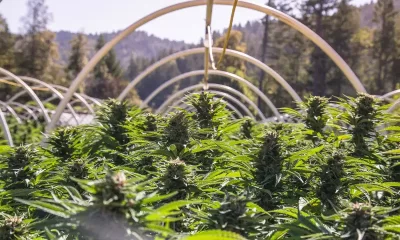Business
San Bernardino’s Operation Hammer Strike Concludes Illegal Cannabis Eradication

The San Bernardino County Sheriff’s Marijuana Enforcement Team (MET) recently updated the public with data regarding its illegal cultivation investigations over the past year.
In a press release, the MET released data about the operation’s many successes. “Since August 26, 2022, MET investigators have served 127 search warrants at illegal cultivation locations, arresting 103 suspects,” the MET stated. “As a result of the search warrants, investigators have seized 158,906 marijuana plants, 29,897 pounds of processed marijuana, 30 firearms, 28,259 grams (62.3 pounds) of concentrated marijuana, 5,443 grams (11.9 pounds) of Psilocybin mushrooms, and seized approximately $1,643,688.00 in illicit proceeds. Investigators also eradicated 1,188 greenhouses found at these locations, and mitigated six electrical bypasses and seven Tetrahydrocannabinol (THC) extraction labs.”
All of the investigations found offenders in violation of the California Medical and Adult-Use Cannabis Regulation and Safety Act, as well as San Bernardino County ordinance, which does not allow commercial cannabis. The county also does not allow outdoor cannabis cultivation.
Although Operation Hammer Strike has concluded, the department states that county sheriffs will continue to investigate illegal cultivation. “The Sheriff’s Gangs/Narcotics Division will continue to enforce California’s cannabis laws and San Bernardino County’s cannabis cultivation and distribution ordinance. Persons found guilty of violating the state law and county ordinance are subject to fines, prosecution, and seizure of property.”
Operation Hammer Strike began in September 2021. At the time, there were an estimated 1,285 illegal grows reported throughout the county. In September, the MET began with a search warrant investigation of Hesperia, Pinon Hills, Phelan, and Landers, which resulted in numerous arrests and seizures of cannabis plants, processed cannabis product, firearms, and $30,000 cash. During the same month, another investigation yielded even more arrests and product seizures. This trend continued throughout 2021 and into 2022, with press releases describing the investigations in October 2021, November 2021, January 2022, February, and March.
In March, San Bernardino County sponsored state legislation with Assembly Bill 2728 and Senate Bill 1426 to stop illegal cannabis cultivation. “Illegal cannabis farming is devastating the desert communities of San Bernardino County,” said Supervisor Curt Hagman. “The County is determined to stop this terrible damage to the environment and to protect the lives and property of our residents from lawless criminals.”
Assemblymember Thurston “Smitty” Smith also explained the reasoning behind the push to eliminate illegal grows. “The people of California let their voices be heard and chose to decriminalize cannabis. I support their choice. However, what they didn’t ask for was rampant cultivation and an illegal market sucking up resources, destroying the environment, and putting our communities at risk,” said Smith.
By May 2022, one region of San Bernardino County reported that there were no more reported cannabis grows in the area. “I’m sure there are more out there but we actually have zero grows left in the Morongo Basin that have been reported to us,” Sheriff Shannon Dicus of Morongo Basin told the Hi-Desert Star. San Bernardino County Supervisor Dawn Rowe commented on the quick call to action. “It normally takes this county a long time to make changes for our residents but this was not the case. Thank you very much on behalf of our residents for making it a safer place to live again,” Rowe said.
Statewide efforts to eliminate illegal cannabis grows have continued steadily. Back in October 2021, California Attorney Rob Bonta announced that the Campaign Against Marijuana Planting (CAMP) resulted in the destruction of over one million cannabis plants. “Illegal and unlicensed marijuana planting is bad for our environment, bad for our economy, and bad for the health and safety of our communities,” Bonta said in a press release.
More recently in July, agencies like the California Department of Fish and Wildlife announced the authorization of enforcement teams to investigate illegal cultivation during the 2022 growing season.
In October, Bonta announced that CAMP would henceforth be called the Eradication and Prevention of Illicit Cannabis (EPIC), and would continue to investigate illegal cultivation. “The illicit marketplace outweighs the legal marketplace,” Bonta said. “It’s upside down and our goal is complete eradication of the illegal market.”
Business
New Mexico cannabis operator fined, loses license for alleged BioTrack fraud

New Mexico regulators fined a cannabis operator nearly $300,000 and revoked its license after the company allegedly created fake reports in the state’s traceability software.
The New Mexico Cannabis Control Division (CCD) accused marijuana manufacturer and retailer Golden Roots of 11 violations, according to Albuquerque Business First.
Golden Roots operates the The Cannabis Revolution Dispensary.
The majority of the violations are related to the Albuquerque company’s improper use of BioTrack, which has been New Mexico’s track-and-trace vendor since 2015.
The CCD alleges Golden Roots reported marijuana production only two months after it had received its vertically integrated license, according to Albuquerque Business First.
Because cannabis takes longer than two months to be cultivated, the CCD was suspicious of the report.
After inspecting the company’s premises, the CCD alleged Golden Roots reported cultivation, transportation and sales in BioTrack but wasn’t able to provide officers who inspected the site evidence that the operator was cultivating cannabis.
In April, the CCD revoked Golden Roots’ license and issued a $10,000 fine, according to the news outlet.
The company requested a hearing, which the regulator scheduled for Sept. 1.
At the hearing, the CCD testified that the company’s dried-cannabis weights in BioTrack were suspicious because they didn’t seem to accurately reflect how much weight marijuana loses as it dries.
Company employees also poorly accounted for why they were making adjustments in the system of up to 24 pounds of cannabis, making comments such as “bad” or “mistake” in the software, Albuquerque Business First reported.
Golden Roots was fined $298,972.05 – the amount regulators allege the company made selling products that weren’t properly accounted for in BioTrack.
The CCD has been cracking down on cannabis operators accused of selling products procured from out-of-state or not grown legally:
- Regulators alleged in August that Albuquerque dispensary Sawmill Sweet Leaf sold out-of-state products and didn’t have a license for extraction.
- Paradise Exotics Distro lost its license in July after regulators alleged the company sold products made in California.
Golden Roots was the first alleged rulebreaker in New Mexico to be asked to pay a large fine.
Source: https://mjbizdaily.com/new-mexico-cannabis-operator-fined-loses-license-for-alleged-biotrack-fraud/
Business
Marijuana companies suing US attorney general in federal prohibition challenge

Four marijuana companies, including a multistate operator, have filed a lawsuit against U.S. Attorney General Merrick Garland in which they allege the federal MJ prohibition under the Controlled Substances Act is no longer constitutional.
According to the complaint, filed Thursday in U.S. District Court in Massachusetts, retailer Canna Provisions, Treevit delivery service CEO Gyasi Sellers, cultivator Wiseacre Farm and MSO Verano Holdings Corp. are all harmed by “the federal government’s unconstitutional ban on cultivating, manufacturing, distributing, or possessing intrastate marijuana.”
Verano is headquartered in Chicago but has operations in Massachusetts; the other three operators are based in Massachusetts.
The lawsuit seeks a ruling that the “Controlled Substances Act is unconstitutional as applied to the intrastate cultivation, manufacture, possession, and distribution of marijuana pursuant to state law.”
The companies want the case to go before the U.S. Supreme Court.
They hired prominent law firm Boies Schiller Flexner to represent them.
The New York-based firm’s principal is David Boies, whose former clients include Microsoft, former presidential candidate Al Gore and Elizabeth Holmes’ disgraced startup Theranos.
Similar challenges to the federal Controlled Substances Act (CSA) have failed.
One such challenge led to a landmark Supreme Court decision in 2005.
In Gonzalez vs. Raich, the highest court in the United States ruled in a 6-3 decision that the commerce clause of the U.S. Constitution gave Congress the power to outlaw marijuana federally, even though state laws allow the cultivation and sale of cannabis.
In the 18 years since that ruling, 23 states and the District of Columbia have legalized adult-use marijuana and the federal government has allowed a multibillion-dollar cannabis industry to thrive.
Since both Congress and the U.S. Department of Justice, currently headed by Garland, have declined to intervene in state-licensed marijuana markets, the key facts that led to the Supreme Court’s 2005 ruling “no longer apply,” Boies said in a statement Thursday.
“The Supreme Court has since made clear that the federal government lacks the authority to regulate purely intrastate commerce,” Boies said.
“Moreover, the facts on which those precedents are based are no longer true.”
Verano President Darren Weiss said in a statement the company is “prepared to bring this case all the way to the Supreme Court in order to align federal law with how Congress has acted for years.”
While the Biden administration’s push to reschedule marijuana would help solve marijuana operators’ federal tax woes, neither rescheduling nor modest Congressional reforms such as the SAFER Banking Act “solve the fundamental issue,” Weiss added.
“The application of the CSA to lawful state-run cannabis business is an unconstitutional overreach on state sovereignty that has led to decades of harm, failed businesses, lost jobs, and unsafe working conditions.”
Business
Alabama to make another attempt Dec. 1 to award medical cannabis licenses

Alabama regulators are targeting Dec. 1 to award the first batch of medical cannabis business licenses after the agency’s first two attempts were scrapped because of scoring errors and litigation.
The first licenses will be awarded to individual cultivators, delivery providers, processors, dispensaries and state testing labs, according to the Alabama Medical Cannabis Commission (AMCC).
Then, on Dec. 12, the AMCC will award licenses for vertically integrated operations, a designation set primarily for multistate operators.
Licenses are expected to be handed out 28 days after they have been awarded, so MMJ production could begin in early January, according to the Alabama Daily News.
That means MMJ products could be available for patients around early March, an AMCC spokesperson told the media outlet.
Regulators initially awarded 21 business licenses in June, only to void them after applicants alleged inconsistencies with how the applications were scored.
Then, in August, the state awarded 24 different licenses – 19 went to June recipients – only to reverse themselves again and scratch those licenses after spurned applicants filed lawsuits.
A state judge dismissed a lawsuit filed by Chicago-based MSO Verano Holdings Corp., but another lawsuit is pending.
Source: https://mjbizdaily.com/alabama-plans-to-award-medical-cannabis-licenses-dec-1/
-

 Business2 years ago
Business2 years agoPot Odor Does Not Justify Probable Cause for Vehicle Searches, Minnesota Court Affirms
-

 Business2 years ago
Business2 years agoNew Mexico cannabis operator fined, loses license for alleged BioTrack fraud
-

 Business2 years ago
Business2 years agoAlabama to make another attempt Dec. 1 to award medical cannabis licenses
-

 Business2 years ago
Business2 years agoWashington State Pays Out $9.4 Million in Refunds Relating to Drug Convictions
-

 Business2 years ago
Business2 years agoMarijuana companies suing US attorney general in federal prohibition challenge
-

 Business2 years ago
Business2 years agoLegal Marijuana Handed A Nothing Burger From NY State
-

 Business2 years ago
Business2 years agoCan Cannabis Help Seasonal Depression
-

 Blogs2 years ago
Blogs2 years agoCannabis Art Is Flourishing On Etsy













